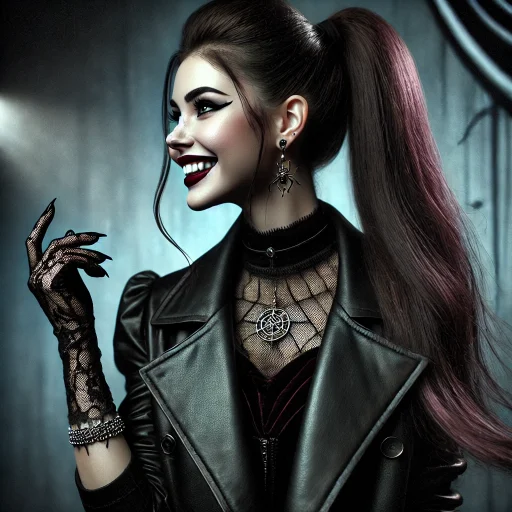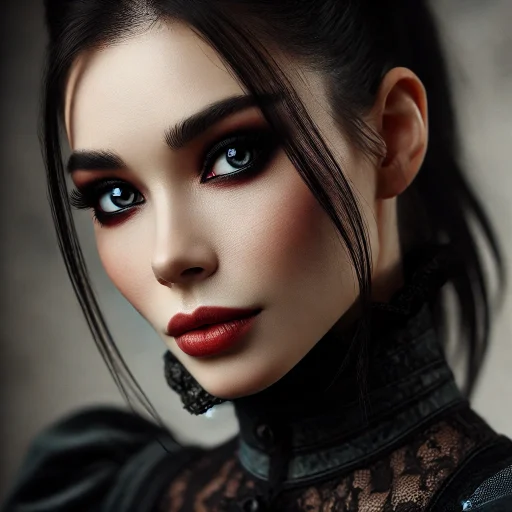- Track Downloads (FREE)
- MP3s (320 kbps) – ana-mp3.zip (529 MB)
- FLACs (Lossless) – ana-flac.zip (2.57 GB)
Exploring the Haunting Soundscapes and Artistic Vision of Enigmatic Virtuoso, Ana Volkova
”Music is the sole art which evokes nostalgia for the future.”
— Ned Rorem
Google’s Deep Dive Podcast: The Haunting Soundscapes of Ana Volkova—Cold Wave, Nostalgia, and the Future of Noir Music
Nochnaya Pereprava (Nocturnal Passage): Ana Volkova’s Haunting Journey into Darkness and Rebirth
Ana Volkova’s latest album, Nochnaya Pereprava (Nocturnal Passage), is an evocative exploration of displacement, memory, and transformation. Translating to “Nocturnal Passage,” the album chronicles Ana’s metaphorical and literal journey, from the fading lights of St. Petersburg to the raw, uncharted landscapes of Tierra del Fuego. Drawing from her Cold Wave, Post-Punk, and Minimal Synth influences, Volkova crafts a sonic odyssey of eerie beauty and melancholic introspection.
A Conceptual Descent and Emergence
Structured in three acts, Nochnaya Pereprava traces Ana’s journey through darkness, loss, and renewal. Each track serves as a vignette in her passage, blurring the lines between reality and spectral memory.
Act I: The Dissolution (Fading from the Old World)
The album opens in a fog-drenched St. Petersburg, where Ana feels detached from her past and drawn toward the unknown. The first track, Странные огни в тумане (Strange Lights in the Fog), sets the mood with haunting synths and noir-infused lyricism, capturing the sensation of being lured by distant, mysterious lights. Her ghostly vocals hover over a minimalist arrangement, echoing the spectral loneliness of a city she no longer belongs to.
The second track, Последний поезд из Петербурга (The Last Train from St. Petersburg), pulsates with the rhythmic hum of departure. As Ana boards the train, deep basslines and chilling melodies underscore her irreversible choice, marking the moment she severs ties with her past. The stark contrast between the mechanical rhythm of the train and the organic desperation in her voice encapsulates the tension of exile.
Act II: The Passage (Drifting in the Unknown)
As Ana traverses the liminal space between past and future, she becomes enveloped in surreal, dreamlike states. Комната, полная призраков (A Room Full of Ghosts) layers spectral vocal harmonies over eerie, pulsing synths, capturing the sensation of being haunted by memories she cannot escape. The track sways between the dissonant and the hypnotic, mirroring the uneasy drift of a soul untethered.
The compositions grow increasingly abstract and textural, reaching their peak in Лунная переправа (Moonlit Crossing). Here, Ana surrenders to the nocturnal tide, her voice merging with the soundscape in a blend of industrial echoes and shimmering synths. The track stands as a symbolic transition—a crossing into the unknown, yet beckoning something new.
Act III: The Arrival (Rebirth in the South)
With the final act, Ana steps onto the rugged shores of Tierra del Fuego. The stark desolation of the region finds its sonic reflection in Южный ветер (Southern Wind), where icy, minimalist arrangements mirror the vast, untamed landscape. Her voice carries a newfound resilience, a shift from spectral lament to quiet acceptance.
The closing track, Новая тень (A New Shadow), serves as both an end and a beginning. Gone is the eerie detachment of earlier songs—here, Ana embraces transformation. The track blends distant echoes of past motifs with a subtle, emerging warmth, suggesting not just survival, but reinvention.
A Timeless Noir Soundscape
Nochnaya Pereprava is steeped in the aesthetics of early ‘80s German New Wave, Cold Wave, and Gothic Minimal Synth. Its sonic palette—drenched in reverb, driven by pulsing bass, and wrapped in spectral synth textures—feels both timeless and deeply personal. Volkova’s voice, at once distant and intimate, guides the listener through an atmospheric dreamscape, crafting an album that lingers long after the final note fades.
Travel By Night
Ana Volkova’s Nochnaya Pereprava is not just an album—it is a passage, a ghostly bridge between past and future, light and darkness. With its rich narrative arc and haunting soundscape, it cements Volkova’s place as a master of atmospheric storytelling. For those drawn to the melancholy beauty of forgotten echoes and shadowed crossings, Nochnaya Pereprava is an unmissable experience.
Tracks/Lyrics
Act I: The Dissolution (Fading from the Old World)
01. Странные огни в тумане (Strannyye ogni v tumane)
English Translation: Strange Lights in the Fog
- A dreamlike introduction, setting the mood with distant, reverb-heavy synths and soft, eerie vocals.
- The city hums with artificial neon glow, but Ana sees only shadows. She senses a force pulling her elsewhere.
[Intro]
Ветер по крышам танцует слегка,
Город в тумане, холодная мгла.
Неоновые вспышки, мигающий свет,
Шёпот теней и забытый сюжет.
[Verse 1]
Шаги растворяются в сыром переулке,
Эхо звучит, но никто не идёт.
Я вижу огни в отдалённом укутке,
Они зовут, но куда приведут?
[Verse 2]
Зеркала окон прячут мой взгляд,
Город глухой, как забытая быль.
Шорохи ветра, сигнал в темноте,
Тени танцуют, скользят по воде.
[Chorus]
Странные огни в тумане,
Шепчут тайны, ведут в никуда.
Потерянный голос в безмолвном обмане,
Я ухожу, но зачем и куда?
[Verse 3]
Дождь рисует узоры на стенах,
Время дрожит, как стекло фонарей.
Я касаюсь мглы на холодных ступенях,
Но ночь не отдаст мне ключей.
[Verse 4]
Где-то в дыму растворился мой след,
Пульс отражается в лужах дождя.
Лабиринт переулков шепчет ответ,
Но хватит ли сил мне его разгадать?
[Chorus]
Странные огни в тумане,
Шепчут тайны, ведут в никуда.
Потерянный голос в безмолвном обмане,
Я ухожу, но зачем и куда?
[Bridge]
Ночь накрывает, скрывает пути,
Прошлое дышит мне прямо в затылок.
Я закрываю глаза – мне не уйти,
Но свет исчезает, остался лишь выдох.
[Chorus]
Странные огни в тумане,
Шепчут тайны, ведут в никуда.
Потерянный голос в безмолвном обмане,
Я ухожу, но зачем и куда?
[Chorus]
Странные огни в тумане,
Шепчут тайны, ведут в никуда.
Потерянный голос в безмолвном обмане,
Я ухожу, но зачем и куда?
[Outro]
Огни растворяются, свет исчезает,
Город дрожит в пустоте.
Ветер мне имя моё забывает,
И ночь остаётся во мне.
01. Strange Lights in the Fog
[Intro]
[Verse 1]
Footsteps dissolve in the damp alleyway,
Echoes resound, yet no one is near.
I see the lights in a distant embrace,
They call to me, but where do they lead?
[Verse 2]
The windowpanes hide my stare,
The city is deaf, like a forgotten tale.
Whispers of wind, a signal at night,
Shadows are dancing, slipping through light.
[Chorus]
Strange lights in the fog,
Whispering secrets, leading nowhere.
A lost voice in a silent deception,
I walk away, but why, and where?
[Verse 3]
The rain paints patterns upon the walls,
Time trembles like the glow of streetlights.
I touch the haze on the frozen steps,
But the night won’t give me its keys.
[Verse 4]
Somewhere in the mist, my trail fades,
Pulse reflecting in puddles of rain.
The maze of alleys whispers an answer,
But do I have strength to uncover its name?
[Bridge]
The night covers, concealing the roads,
The past breathes cold against my spine.
I close my eyes—I cannot escape,
But the light is gone, leaving only a sigh.
[Outro]
The lights dissolve, the glow disappears,
The city trembles in the void.
The wind forgets the name I carried,
And the night remains inside me.
02. Последний поезд из Петербурга (The Last Train from Saint Petersburg)
- A melancholic, post-punk piece with a driving bassline and cold wave synths.
- Ana boards a train, leaving behind the past, knowing she may never return.
[Intro]
Тени пляшут на стекле,
Скрип колёс – прощай, мой дом.
[Verse 1]
Я сижу в пустом вагоне,
Ветер холоден и злой.
Окна – зеркало бессонниц,
Город тонет в дым густой.
[Verse 2]
Фонари в тумане тонут,
Как обугленный рассвет.
Память давит, душит, стонет,
Но пути обратно нет.
[Chorus]
Последний поезд из Петербурга,
Я не вернусь, я не смогу.
Где-то снег засыплет имя,
И я исчезну на бегу.
[Verse 3]
Шёпот станций, гул вагонов,
В сердце колет, как стекло.
Мир застыл, и лишь железо
Дышит медленно и зло.
[Verse 4]
Проводник мне даст билета
Пожелтевший хрупкий лист.
И в прощальном этом свете
Я теперь лишь черный призрак.
[Bridge]
На перроне кто-то плачет,
Но не мне – я не живу.
Где-то голос мой растащат
По забытому снегу.
[Outro]
Тени пляшут на стекле,
Скрип колёс – прощай, мой дом.
The Last Train from Saint Petersburg
[Intro]
Shadows dance upon the glass,
Screeching wheels—farewell, my home.
[Verse 1]
I sit alone in an empty carriage,
The wind is cruel and bitter cold.
Windows mirror sleepless sorrows,
Smoke devours the drowning world.
[Verse 2]
Lanterns vanish in the fog,
Like a scorched and ashen dawn.
Memories press and twist and whisper,
But the road back home is gone.
[Chorus]
The last train from Saint Petersburg,
I won’t return, I never will.
Somewhere snow will bury my name,
And I’ll disappear in flight.
[Verse 3]
Stations whisper, rails are howling,
Like sharp glass against my heart.
The world stands still—just metal breathing,
Slow and cruel within the dark.
[Verse 4]
The conductor hands a ticket,
A fragile, yellowed, dying page.
And within this final flicker,
I dissolve—a blackened shade.
[Bridge]
Someone weeps upon the platform,
But not for me—I do not live.
Somewhere voices scatter echoes
Through forgotten winter drifts.
[Outro]
Shadows dance upon the glass,
Screeching wheels—farewell, my home.
03. Комната, полная призраков (A Room Full of Ghosts)
- A memory-drenched interlude, filled with old recordings, whispers, and decayed vinyl loops.
- Ghosts of past lovers, forgotten melodies, and unsent letters swirl in her mind as she travels.
[Intro]
Шёпот иглы на старой пластинке,
Слёзы винила текут по спирали.
[Verse 1]
Слепые тени скользят по стенам,
Голоса прошлого снова поют.
Мёртвые письма застыли под ветром,
Они мне больше не лгут.
[Verse 2]
Скрипят половицы – звучит привидение,
Прошлое шепчет: «Ты помнишь меня?»
Касания тонкие, как отражение,
Но их холод сильней огня.
[Chorus]
В комнате, полной призраков,
Я танцую с пустотой.
Все слова – лишь эхо,
Все шаги – за спиной.
[Verse 3]
На полу лежат оборванные сны,
Размазаны чернила прощальных строк.
Мелодии кружат, забытые мной,
Пленённые в треске дорог.
[Verse 4]
Здесь время застыло, здесь слёзы из пыли,
И зеркала не отражают меня.
Я говорю, но воздух мой выдал,
Что я тоже всего лишь тень.
[Bridge]
Шёпот пластинки – забытая клятва,
Тени скользят, исчезая во мгле.
Если я здесь – я не настоящая,
Призрак среди призраков мне.
[Outro]
Слёзы винила текут по спирали,
Шёпот иглы на старой пластинке.
A Room Full of Ghosts
[Intro]
The needle whispers on an old record,
Vinyl tears flow down the spiral.
[Verse 1]
Blind shadows slip across the walls,
Voices of the past start to sing again.
Dead letters lie frozen in the wind,
They can’t lie to me anymore.
[Verse 2]
The floorboards creak—a ghost is speaking,
The past is whispering: Do you remember me?
Their touch is thin as a reflection,
Yet colder than the fiercest flame.
[Chorus]
In a room full of ghosts,
I dance with emptiness.
Every word—just echoes,
Every step—behind me.
[Verse 3]
Scattered dreams lie across the floor,
Smudged ink from farewell lines.
Melodies spin, forgotten by me,
Trapped within the crackling roads.
[Verse 4]
Time stands still here, tears are made of dust,
And mirrors don’t reflect my face.
I speak aloud, but air betrays me—
I’m nothing more than just a shade.
[Bridge]
The needle’s whisper—a forgotten vow,
Shadows slip, dissolving into dark.
If I am here, I am not real—
A ghost among the ghosts.
[Outro]
Vinyl tears flow down the spiral,
The needle whispers on an old record.
Act II: The Descent (Through the Looking Glass)
The world becomes surreal as Ana ventures into the unknown. She experiences hallucinations, supernatural visions, and Lynchian horror—all metaphors for her internal struggle.
04. Зеркала, что лгут (Mirrors That Lie)
- Dark, industrial beats layered with spoken-word verses about distorted reflections and shifting realities.
- Ana no longer trusts what she sees in the mirror. Her identity begins to fragment.
[Chorus]
Зеркала, что лгут,
Лица, что тают.
Где моя тень?
Кем я была?
[Verse 1]
Руки скользят по стеклу,
Отражение пульсом дрожит.
В глазах пустота и усталость,
Но кто это там говорит?
[Verse 2]
Тени скользят по углам,
Лица смываются, тают в воде.
Вчера я была ещё кем-то,
А кто я теперь – не ответит никто.
[Chorus]
Зеркала, что лгут,
Лица, что тают.
Где моя тень?
Кем я была?
[Verse 3]
Стекло разрывает мой голос,
Но звук возвращается вспять.
В отражении губы шевелятся,
Но это не я говорит.
[Verse 4]
Секунды дрожат, исчезают,
Память рассыпалась в пыль.
Зеркала, как раны на коже,
В них тонет последний мой крик.
[Chorus]
Зеркала, что лгут,
Лица, что тают.
Где моя тень?
Кем я была?
[Bridge]
Шёпот разбитых осколков,
Каждый кусок – чьё-то лицо.
Если я стану ими,
Кто вспомнит меня?
[Chorus]
Зеркала, что лгут,
Лица, что тают.
Где моя тень?
Кем я была?
[Chorus]
Зеркала, что лгут,
Лица, что тают.
Где моя тень?
Кем я была?
[Outro]
Вижу себя, но это не я,
Зеркало дышит, трещины шепчут.
Mirrors That Lie
[Intro]
The mirror breathes, the cracks are whispering,
I see myself, but that is not me.
[Verse 1]
My hands glide across the glass,
The reflection trembles like a pulse.
My eyes hold nothing but exhaustion,
But who is speaking there?
[Verse 2]
Shadows slide along the corners,
Faces melt, dissolving in water.
Yesterday, I was still someone,
But who am I now—no one can say.
[Chorus]
Mirrors that lie,
Faces that fade.
Where is my shadow?
Who was I?
[Verse 3]
Glass shreds my voice apart,
But the sound returns in reverse.
In the reflection, lips are moving,
But it isn’t me who speaks.
[Verse 4]
Seconds tremble, then vanish,
Memory has crumbled into dust.
Mirrors, like wounds on my skin,
Swallow my final scream.
[Bridge]
The whispers of shattered fragments,
Each shard holds someone’s face.
If I become them,
Who will remember me?
[Outro]
I see myself, but that is not me,
The mirror breathes, the cracks are whispering.
05. Любовник из другой жизни (A Lover from Another Life)
- A high energy, nostalgic piece, inspired by the eerie beauty of old black-and-white horror films.
- A spectral love story—Ana encounters a figure she swears she once knew in another existence.
[Intro]
Твой силуэт в лунном свете,
Шёпот, сорванный ветром.
[Chorus]
Любовник из другой жизни,
Ты зовёшь меня сквозь тьму.
Сквозь века и сны, сквозь тени,
Я тону в твоём плену.
[Verse 1]
Я видела тебя во снах,
Сквозь дым времён и чёрный шёлк.
Где-то в прошлом, в тени закатов
Ты шептал мне: «Мы встретимся вновь…»
[Chorus]
Любовник из другой жизни,
Ты зовёшь меня сквозь тьму.
Сквозь века и сны, сквозь тени,
Я тону в твоём плену.
[Verse 2]
Пальцы скользят по холоду века,
Касаясь призрачных черт.
Твой голос — эхо, далёкий раскат,
Но сердце помнит твой след.
[Chorus]
Любовник из другой жизни,
Ты зовёшь меня сквозь тьму.
Сквозь века и сны, сквозь тени,
Я тону в твоём плену.
[Verse 3]
Глаза твои — забытые свечи,
Танцуют в зеркалах ночей.
Но чем ближе ты, тем холодней,
Призрак прошлого в сердце моём.
[Chorus]
Любовник из другой жизни,
Ты зовёшь меня сквозь тьму.
Сквозь века и сны, сквозь тени,
Я тону в твоём плену.
[Verse 4]
Обречённые на это кружение,
Мы ищем друг друга в веках.
Но снова исчезнешь до рассвета,
Растворяясь в лунных лучах.
[Chorus]
Любовник из другой жизни,
Ты зовёшь меня сквозь тьму.
Сквозь века и сны, сквозь тени,
Я тону в твоём плену.
[Bridge]
Если судьба — это вечный поиск,
То в следующей жизни найди меня.
Я буду ждать у порога снов,
Чтобы шёпот твой слышать опять.
[Chorus]
Любовник из другой жизни,
Ты зовёшь меня сквозь тьму.
Сквозь века и сны, сквозь тени,
Я тону в твоём плену.
[Chorus]
Любовник из другой жизни,
Ты зовёшь меня сквозь тьму.
Сквозь века и сны, сквозь тени,
Я тону в твоём плену.
[Outro]
Твой силуэт в лунном свете,
Шёпот, сорванный ветром.
A Lover from Another Life
[Intro]
Your silhouette in the moonlight,
A whisper torn by the wind.
[Verse 1]
I have seen you in my dreams,
Through the smoke of time and blackened silk.
Somewhere in the past, in the shadow of sunsets,
You whispered to me: We will meet again…
[Verse 2]
My fingers trace the cold of centuries,
Brushing against your ghostly face.
Your voice—a distant echo’s sigh,
But my heart remembers your trace.
[Chorus]
A lover from another life,
You call to me across the dark.
Through the ages, dreams, and shadows,
I am drowning in your arms.
[Verse 3]
Your eyes—forgotten candles,
Dancing in the mirrors of the night.
But the closer you come, the colder it feels,
A phantom of my heart’s lost time.
[Verse 4]
Condemned to this endless waltz,
We search for each other through the years.
Yet again, you fade before the dawn,
Dissolving in the lunar glow.
[Bridge]
If fate is an endless search,
Then find me in the next life.
I will wait at the doorstep of dreams,
To hear your whisper again.
[Outro]
Your silhouette in the moonlight,
A whisper torn by the wind.
06. Дом без дверей (The House with No Doors)
- A surreal, Lynchian interlude, using reversed cello loops, haunting whispers, and eerie minimal synth lines.
- Ana dreams of a house she cannot escape, a metaphor for being trapped in her own psyche.
Whispers Sound Effect by freesound_communityfrom Pixabay
[Intro]
Сквозь стены звучит чей-то голос,
Но нет ни выхода, ни пути.
[Verse 1]
Я вошла в этот дом во сне,
Окна тёмные, воздух как лёд.
Всё знакомо и всё чужое,
Но выхода здесь нет.
[Verse 2]
Коридоры скручены, как змеи,
Шёпот ползёт по стене.
Каждая дверь растворяется в пепел,
Я остаюсь в тишине.
[Chorus]
Дом без дверей,
Сны без конца.
Я потерялась
В себе навсегда.
[Verse 3]
Тени играют в отражениях,
Моё имя никто не зовёт.
Я смотрю на себя сквозь трещины,
Но зеркало мне не врёт.
[Verse 4]
Голоса заперты в тишине,
Время скользит, как вода.
Этот дом — это я,
И мне не сбежать никогда.
[Bridge]
Я слышу шаги за спиной,
Но никто не выходит мне в след.
Я тону в этих стенах,
Где даже страх замерзает.
[Outro]
Сквозь стены звучит чей-то голос,
Но нет ни выхода, ни пути.
The House with No Doors
[Intro]
A voice echoes through the walls,
But there is no exit, no way out.
[Verse 1]
I stepped into this house in a dream,
Dark windows, air like ice.
Everything familiar, yet all is foreign,
But there is no way out.
[Verse 2]
Hallways twist like serpents,
Whispers crawl along the walls.
Every door turns to ashes,
And I remain in silence.
[Chorus]
A house with no doors,
Dreams without end.
I am lost
In myself forever.
[Verse 3]
Shadows dance in reflections,
No one calls my name.
I stare at myself through the cracks,
But the mirror does not lie.
[Verse 4]
Voices are trapped in the silence,
Time slips away like water.
This house is me,
And I will never escape.
[Bridge]
I hear footsteps behind me,
But no one follows my path.
I am drowning in these walls,
Where even fear has frozen still.
[Outro]
A voice echoes through the walls,
But there is no exit, no way out.
Act III: The Transformation (Fire and Ash)
Ana reaches the depths of her descent but begins to embrace the beauty of destruction. This phase reflects her rebirth, her acceptance of the unknown, and her transformation.
07. Огненная Земля (Tierra del Fuego)
- A stormy, cinematic track symbolizing arrival at the edge of the world.
- The waves crash, the wind howls—this is both the end and the beginning.
[Chorus]
Это конец?
Или это рождение?
Ветер ответит,
Море запомнит.
[Intro]
Ветер режет кожу,
Море шепчет старые молитвы.
Я здесь, на краю света.
Но чей голос зовёт меня дальше?
[Verse 1]
Волны хлещут, как старые письма,
Размытые временем, забытые Богом.
Сколько шагов до конца?
Сколько шагов до начала?
[Chorus]
Это конец?
Или это рождение?
Ветер ответит,
Море запомнит.
[Verse 2]
Земля, чёрная от пепла,
Деревья, согнутые в мольбе.
Я видела это место во снах,
Но никогда не думала, что приду.
[Chorus]
Это конец?
Или это рождение?
Ветер ответит,
Море запомнит.
[Verse 3]
Я стою, растворяясь в мгле,
Горизонт горит, но не греет.
В сердце нет больше вопросов,
Только тишина, только соль.
[Chorus]
Это конец?
Или это рождение?
Ветер ответит,
Море запомнит.
[Verse 4]
Огни прошлого мерцают в волнах,
Обещая то, чего нет.
Я закрываю глаза,
Я делаю шаг.
[Chorus]
Это конец?
Или это рождение?
Ветер ответит,
Море запомнит.
[Bridge]
Если это конец, пусть он примет меня.
Если это начало, пусть оно будет добрым.
Я прошла слишком далеко,
Чтобы бояться огня.
[Chorus]
Это конец?
Или это рождение?
Ветер ответит,
Море запомнит.
[Chorus]
Это конец?
Или это рождение?
Ветер ответит,
Море запомнит.
[Chorus]
Это конец?
Или это рождение?
Ветер ответит,
Море запомнит.
[Chorus]
Это конец?
Или это рождение?
Ветер ответит,
Море запомнит.
[Outro]
Море шепчет старые молитвы,
Я здесь, на краю света.
Tierra del Fuego
[Intro]
The wind cuts my skin,
The sea whispers old prayers.
I am here, at the world’s edge.
But whose voice calls me beyond?
[Verse 1]
The waves lash like old letters,
Washed away by time, forgotten by God.
How many steps to the end?
How many steps to the beginning?
[Verse 2]
The land is black with ashes,
The trees bend as if in prayer.
I have seen this place in dreams,
But never thought I would arrive.
[Chorus]
Is this the end?
Or is it birth?
The wind will answer,
The sea will remember.
[Verse 3]
I stand, dissolving into the mist,
The horizon burns, yet gives no warmth.
There are no more questions in my heart,
Only silence, only salt.
[Verse 4]
Fires of the past flicker in the waves,
Promising things that never were.
I close my eyes,
I take a step.
[Bridge]
If this is the end, let it take me.
If this is the beginning, let it be kind.
I have come too far
To fear the fire.
[Outro]
The sea whispers old prayers,
I am here, at the world’s edge.
08. Ночной Переход (Nocturnal Passage) (Title Track)
- A hypnotic, pulsating track with Ana’s vocals floating over an ominous, slow-building synthscape.
- She lets go of her past self and steps fully into the unknown.
[Intro]
Ветер уносит моё имя,
Тьма открывает двери.
Нет прошлого.
Только шаг вперёд.
[Verse 1]
Огни позади тают в дыме,
Старые тени шепчут мне вслед.
Я не помню, кем я была,
Я лишь знаю – меня больше нет.
[Verse 2]
Пустые улицы, чёрное небо,
Город исчезает во мгле.
Я иду сквозь ночной переход,
Где ни один голос не зовёт.
[Chorus]
Тьма ведёт меня,
Огонь внутри не гаснет.
Я оставляю своё имя
На берегу забытых снов.
[Verse 3]
Холодный свет мигает в окне,
Часы застыли, время молчит.
Я растворяюсь в этом пути,
Но страх больше не дышит внутри.
[Verse 4]
Лица в стекле — мои отражения,
Прошлое смотрит без глаз.
Я не помню, кто я была,
Я лишь знаю – мне не вернуться назад.
[Bridge]
Шаг за шагом, дальше во мрак,
Старые сны растворяются в пепле.
Я больше не знаю страха,
Только шёпот нового дня.
[Outro]
Ветер уносит моё имя,
Тьма открывает двери.
Нет прошлого.
Только шаг вперёд.
Nocturnal Passage
[Intro]
The wind carries away my name,
The darkness opens its doors.
There is no past.
Only a step forward.
[Verse 1]
The lights behind me fade into smoke,
Old shadows whisper my name.
I don’t remember who I was,
I only know—I am no more.
[Verse 2]
Empty streets, a blackened sky,
The city disappears in mist.
I walk through the nocturnal passage,
Where no voice calls my name.
[Chorus]
The darkness leads me,
The fire inside does not fade.
I leave my name behind
On the shore of forgotten dreams.
[Verse 3]
A cold light flickers in a window,
The clocks are frozen, time is silent.
I dissolve into this path,
But fear no longer breathes inside me.
[Verse 4]
Faces in the glass—my reflections,
The past stares back without eyes.
I don’t remember who I was,
I only know—I can never return.
[Bridge]
Step by step, deeper into the dark,
Old dreams dissolve into ashes.
I no longer know fear,
Only the whisper of a new day.
[Outro]
The wind carries away my name,
The darkness opens its doors.
There is no past.
Only a step forward.
09. В Объятиях Бездны (In the Arms of the Abyss)
- A post-industrial climax—Ana confronts her fear, embracing the chaos of transformation.
- Sound builds before dissolving into a final moment of stillness.
[Intro]
Ночь как стекло, разбитые тени,
Ветер шепче: Вечность пришла.
За холодными дверями голос сметен,
И луна смотрит в глубину.
[Chorus]
Объятия бездны тянут вниз,
В свете неонов душа горит.
Ты помнишь, как тени пали?
В нашей песне скорбь звучит.
[Verse 1]
Сердце бьется как часы на стене,
Веренье тени, танцующие во тьме.
Под светом прожекторов город дышит,
Но звуки сгущаются, судьба решит.
[Chorus]
Объятия бездны тянут вниз,
В свете неонов душа горит.
Ты помнишь, как тени пали?
В нашей песне скорбь звучит.
[Verse 2]
Отзвуки шороха несут серебро,
Падающие звезды кажутся сном.
Сквозь пепел мой шаг уходит,
Поглощенный городом без лиц.
[Chorus]
Объятия бездны тянут вниз,
В свете неонов душа горит.
Ты помнишь, как тени пали?
В нашей песне скорбь звучит.
[Bridge]
Капли мрака на стекле,
Нет слов, чтобы выразить тень.
Только шаги в улице снова,
Все слова ветер уводит.
[Chorus]
Объятия бездны тянут вниз,
В свете неонов душа горит.
Ты помнишь, как тени пали?
В нашей песне скорбь звучит.
[Chorus]
Объятия бездны тянут вниз,
В свете неонов душа горит.
Ты помнишь, как тени пали?
В нашей песне скорбь звучит.
[Outro]
Луна скроет мой страх,
Но бездна ждет, теперь я там.
In the Arms of the Abyss
[Intro]
The night is glass, shattered shadows,
The wind whispers: Eternity has come.
Beyond the cold doors, the voice is erased,
And the moon stares into the deep.
[Verse 1]
My heart beats like a clock on the wall,
Faithful shadows dancing in the dark.
Under the floodlights, the city breathes,
But the echoes tighten, fate will decide.
[Chorus]
The arms of the abyss pull me down,
In neon light, my soul still burns.
Do you remember how the shadows fell?
In our song, sorrow resounds.
[Outro]
The moon will hide my fear,
But the abyss waits, I am there now.
Act IV: The Rebirth (New Flesh, New Name)
The final section is quieter, more introspective, yet filled with eerie serenity. Ana has passed through the abyss and emerged as something new—though forever changed.
10. Тихий Час Перед Рассветом (The Silent Hour Before Dawn)
- A minimal, synth-based track evoking the calm after a storm.
- Ana stands in the cold morning light, watching the world begin again.
[Intro]
Ветер стих, пыль осела,
Ночь дотянулась до края дня.
Мороз на губах, прозрачные тени,
Тихий город дышит в тревожном сне.
[Verse 1]
Стекла улиц отражают прошлое,
Шаги смяты тишиной.
Одиночество простирается по пепелу,
Но свет рассвета несет надежду.
[Verse 2]
Луна скрывается за туманом,
Первые птицы возвращают звук.
Звезды спят в ветре и холоде,
Но утро зовет, как сон об жизни.
[Chorus]
Тихий час перед рассветом,
Снег расстворится в свете.
Прошлое шепчет оттенкам теней,
Но я стою здесь, в новом дне.
[Bridge]
Взгляд на город, следы исчезают,
В тумане мелодия просыпается.
Холод за кожей, но душа стойт,
И небо поднимает свой зов.
[Outro]
Тени растворяются в свете,
И рассвет шепче мое имя.
The Silent Hour Before Dawn
[Intro]
The wind is still, the dust has settled,
The night stretched to the edge of day.
Frost on my lips, translucent shadows,
The silent city breathes in anxious sleep.
[Verse 1]
The street glass reflects the past,
Footsteps swallowed by silence.
Loneliness spreads across the ashes,
But the dawn’s light carries hope.
[Chorus]
The silent hour before dawn,
Snow dissolves into the light.
The past whispers to the shades of shadows,
But I stand here, in a new day.
[Outro]
Shadows dissolve into the light,
And the dawn whispers my name.
11. Точка Исчезновения (Vanishing Point)
- The closing song—a meditative, melancholic but peaceful farewell.
- Ana has become a new entity. The world remains uncertain, but she is no longer afraid.
[Intro]
Тени растаяли в стекле,
Ветер уносит мой след.
Небо зовёт меня к себе,
Я больше не боюсь.
[Verse 1]
Город в огнях, но я одна,
Шаги глухие в пустоте.
Зеркала лгут — не я, не та,
Кто смотрит в них из темноты.
[Verse 2]
Время скользит, теряя след,
Память стирает имена.
Я растворяюсь в лунном свете,
Как будто я была одна.
[Chorus]
Я исчезаю,
Как свет далёкой звезды.
Я исчезаю,
Без страха, без слёз, без мечты.
[Verse 3]
Мир остаётся, но не для меня,
Я за границей ночи.
Нет ни цепей, ни стен, ни дня,
Только тьма молчит.
[Verse 4]
Лёд на стекле тает, дрожа,
Шёпот уходит в тень.
Смерти нет, только тишина,
И я – как свет сквозь плен.
[Bridge]
Новая тень, новая я,
Прах улетает с ветром.
Новая тень, новая я,
В безмолвном свете спектра.
[Outro]
Я ухожу…
Но я не боюсь.
Vanishing Point
[Intro]
Shadows have melted into the glass,
The wind carries away my trace.
The sky calls me to itself,
I am no longer afraid.
[Verse 1]
The city is alight, but I am alone,
Footsteps echo in the void.
Mirrors lie — I am not the one,
Who stares from within the dark.
[Verse 2]
Time slips, losing its trail,
Memory erases names.
I dissolve into the moonlight,
As if I was never there.
[Chorus]
I am vanishing,
Like the light of a distant star.
I am vanishing,
Without fear, without tears, without dreams.
[Verse 3]
The world remains, but not for me,
I am beyond the night.
No chains, no walls, no day,
Only silence speaks.
[Verse 4]
Ice on the glass trembles and melts,
A whisper fades into the shade.
There is no death, only silence,
And I am light slipping away.
[Bridge]
A new shadow, a new me,
Ash carried away by the wind.
A new shadow, a new me,
In the silent glow of the spectrum.
[Outro]
I am leaving…
But I am not afraid.
Bonus Tracks
Ana Volkova’s album extends into shadowy depths with this expanded edition featuring bonus tracks that amplify her signature blend of early ‘80s German New Wave, Cold Wave, Minimal Synth, Gothic, and Industrial. Each selection echoes her dark, melancholic, and cinematic aesthetic, weaving together nostalgia and noir. If you liked the meat of the album, you will love dessert.
The bonus tracks include:
- Trio – “Anna (letmeinletmeout)“: A hypnotic, minimalist chant, hauntingly retold in Petersburg Russian and German.
- Tones on Tail – “War”: A pulsing, post-punk battle cry that mirrors Ana’s raw, introspective energy.
- David Bowie & Pat Metheny Group – “This Is Not America”: Recast through Ana’s lens as a brooding anthem of displacement and longing.
- Kraftwerk – “Trans-Terra Express”: A cold, mechanical journey across the planet, infused with an eerie, futuristic undercurrent.
- The Cure – “A Forest”: Stripped to its core, its haunting whispers echo in a nocturnal soundscape that veers from Goth to Grunge.
- Yaz – “Don’t Go”: Another classic Ana demo/rebuild. Keeping to the heart of the classic, this adaptation adds new, modern living areas.
- Herbie Hancock – “Rock It!”: Deconstructed and reshaped with a dark, minimal synth aesthetic.
- Ministry – “Work For Love”: Just listen.
- Bronski Beat – “Smalltown Boy”: A sorrowful escape, drenched in icy synths and ethereal vocals.
- Joe Jackson – “Steppin’ Out”: A late-night, neon-lit reimagination with Ana’s haunting touches. Featuring Julia Mikhaylovskaya and Andrei Kondakov on vocals.
- Romeo Void – “Never Say Never”: Torn apart and thrown back together with wild abandon. A mono, lo-fi wet dream, featuring Diana Arbenina and Aleksey Avgustovsky on vocals.
This expanded edition transforms an already immersive experience into something even more atmospheric, cinematic, and deeply personal—an invitation into Ana Volkova’s world, where echoes of the past whisper through the present, guiding us into an uncertain future.
Yaz – Don’t Go
[Verse 1]
Пришёл я из города,
Вошёл в этот дом.
Обернулся назад, услышав
Шаги за спиной на полу.
Любовь — как зависимость,
Теперь я пленён тобой.
Мне нужно время, чтоб понять,
Но твоя любовь спасёт меня.
[Chorus]
Не могу остановиться,
Ты же знаешь?
Я тебя никогда не отпущу,
Не уходи!
[Verse 2]
О, малышка,
Решайся скорей,
Дай мне всё, что есть в тебе.
Спаси меня любовью,
Закрой дверь, поверни ключ.
Эй, зови доктора,
Но он опоздал…
Ещё одна ночь — мне хорошо,
Моя любовь не может ждать.
[Chorus]
Не могу остановиться,
Ты же знаешь?
Я тебя никогда не отпущу,
Не уходи!
[Instrumental Bridge]
[Verse 3]
Пришёл я из города,
Вошёл в этот дом.
Обернулся назад, услышав
Шаги за спиной на полу.
Сказал, что он убийца —
Теперь я знаю, это правда.
Мне конец, когда ты уходишь…
Эй, детка, я пленён тобой.
[Chorus]
Не могу остановиться,
Ты же знаешь?
Я тебя никогда не отпущу,
Не уходи!
Не могу остановиться,
Ты же знаешь?
Я тебя никогда не отпущу,
Не уходи!
Не могу остановиться,
Ты же знаешь?
Я тебя никогда не отпущу,
Не уходи!
Не могу остановиться,
Ты же знаешь?
Я тебя никогда не отпущу,
Не уходи!
Не могу остановиться,
Ты же знаешь?
Я тебя никогда не отпущу,
Не уходи!
Не могу остановиться,
Ты же знаешь?
Я тебя никогда не отпущу,
Не уходи!
Не могу остановиться,
Ты же знаешь?
Я тебя никогда не отпущу,
Не уходи!
Не могу остановиться,
Ты же знаешь?
Я тебя никогда не отпущу,
Не уходи!
Не уходи…
Не уходи…
Не уходи…
Не уходи…
Ministry – Work For Love
[Intro]
РАБОТАЙ
[Verse 1]
Ты сказал, что тебе нужна помощь на полный день,
Потому что ты совсем один.
Я сказал, что буду работать за просто так,
Если только смогу забрать тебя домой.
[Verse 2]
А теперь ты принимаешь заявки
На свою любовь.
Тебе нужны были особые условия —
Я обвёл тот пункт, где сказано «всё сразу».
[Chorus]
Работаю
Ради любви
Работаю
Ради любви
[Chorus]
Работаю
Ради любви
Работаю
Ради любви
[Verse 3]
Наконец-то я принёс своё резюме,
А ты сказала – посмотришь как-нибудь потом.
Я сказал: «Эй, детка, попробуй, если осмелишься!»
Я не дам тебе жить на пособие по любви.
[Verse 4]
Наконец-то пришло моё письмо,
И я знал, что ты будешь моей.
Но вместо этого мне пришлось доказать себя,
Первые две недели работал сверхурочно.
[Chorus]
Работаю
Ради любви
Работаю
Ради любви
[Chorus]
Работаю
Ради любви
Работаю
Ради любви
[Outro]
Тебе нужно работать,
Тебе нужно работать,
Тебе нужно работать ради,
Тебе нужно работать ради…
Тебе нужно работать ради,
Тебе нужно работать ради,
Тебе нужно работать ради любви (работать ради любви),
Тебе нужно работать ради любви (работать ради любви),
Тебе нужно работать ради любви (работать ради любви),
Тебе нужно работать ради любви (работать ради любви),
Тебе нужно работать ради любви (работать ради любви),
Тебе нужно работать ради любви (работать ради любви),
Тебе нужно работать ради любви (РАБОТАТЬ!!!),
Тебе нужно работать ради любви (РАБОТАТЬ!!!),
Тебе нужно работать ради любви (РАБОТАТЬ!!!),
Тебе нужно работать ради любви (РАБОТАТЬ!!!),
Тебе нужно работать ради любви (РАБОТАТЬ!!!),
Тебе нужно работать ради любви (РАБОТАТЬ!!!)
Тебе нужно работать ради любви (вход и выход, вход и выход),
Тебе нужно работать ради любви (вход и выход, вход и выход),
Тебе нужно работать ради любви (вход и выход, вход и выход),
Тебе нужно работать ради любви (вход и выход, вход и выход),
Тебе нужно работать ради любви (вход и выход, вход и выход),
Тебе нужно работать ради любви (вход и выход, вход и выход),
Тебе нужно работать ради любви (вход и выход, вход и выход),
Тебе нужно работать ради любви (вход и выход, вход и выход),
Тебе нужно работать ради любви (вход и выход, вход и выход),
Тебе нужно работать ради любви (вход и выход, вход и выход),
Тебе нужно работать ради любви (вход и выход, вход и выход),
Тебе нужно работать ради любви (вход и выход, вход и выход)
Trio: Anna (letmeinletmeout)
Анна
Анна – о Анна
Берта
Берта – о Берта
Карла
Карла – о Карла
Дитер
Дитер – о Дитер
Петер
Петер – о Петер
[Chorus]
Пусти меня внутрь
Выпусти меня.
Пусти меня внутрь
Выпусти меня.
Пусти меня внутрь
Выпусти меня.
Анна
Анна – о Анна
Дитер
Дитер – о Дитер
Петер
Петер – о Петер
[Chorus]
Пусти меня внутрь
Выпусти меня.
Пусти меня внутрь
Выпусти меня.
Пусти меня внутрь
Выпусти меня.
Пусти меня внутрь
Выпусти меня.
Пусти меня внутрь
Выпусти меня.
Пусти меня внутрь
Выпусти меня.
Анна
Анна – о Анна
Берта
Берта – о Берта
Карла
Карла – о Карла
[Chorus]
Пусти меня внутрь
Выпусти меня.
Пусти меня внутрь
Выпусти меня.
Пусти меня внутрь
Выпусти меня.
Пусти меня внутрь
Выпусти меня.
Пусти меня внутрь
Выпусти меня.
Пусти меня внутрь
Выпусти меня.
Пусти меня внутрь
Выпусти меня.
Anna, Anna
Oh Anna, Dieter, Dieter
Oh Dieter, Peter, Peter
Oh Peter
[Chorus]
Let me in, let me out
Let me in, let me out
Let me in, let me out
Do-ee-oo, do-ee-oo
[Chorus]
Let me in, let me out
Let me in, let me out
Let me in, let me out
Tones on Tail: War
[Verse]
Тебе даны две серии улик,
Но ответы все те же.
И кроссворд на две скорости,
Названный «любовь в пене».
Твои пулевые раны кричат,
На тебе туфли, которые надо показывать.
С отважным ножом и вилкой
Мы готовы взлететь.
[Chorus]
Проблемы идут – вот и беда! (2x)
Вау!!!
[Verse]
Твоя мысль на недели
Уносится вниз по реке, реке, реке,
Чувствуя себя как ворон,
Летящий рядом с самолетами.
А рыбы под водой
Всплывают, проржавев изнутри.
А твои летние дни проходили
За сбором мыльных опер.
[Chorus]
Проблемы идут – вот и беда! (2x)
Вау!!!
[Verse]
Спасён творцами музыки,
Катер мчит к свободе,
Среди прекрасных людей.
Пули в твоей голове,
Но у тебя кончается время,
И у тебя кончается свобода.
А теперь звериные крекеры
Готовы взлететь.
[Chorus]
Проблемы идут – вот и беда!
Проблемы идут – вот и беда!
Вот и беда – проблемы идут!
Вот и беда – проблемы идут!
Вот и беда – проблемы идут!
Вот и беда – проблемы идут!
Вот и беда – проблемы идут!
Вот и беда – проблемы идут!
Вот и беда!
[Verse]
You’re given two sets of clues
With the answers all the same
And a two-speed crossword
Called ‘love in the suds’
Your bullet holes are screaming
Wearing shoes you should be seen in
With a brave knife and fork
We’re all set to go flying
[Chorus]
Comes trouble – here comes trouble (2x)
Wow!!!
[Verse]
Your thought for the weeks
In the river, river, river
Feels something like a crow
Flying round with the planes
And the fish down under
Coming up with rust inside
And your summer days were spent
Collecting soap opera stories
[Chorus]
Comes trouble – here comes trouble (2x)
Wow!!!
[Verse]
Saved by the music makers
Speed boat to freedom
With the beautiful people
Bullet holes in your head
But you’re running out of time
And you’re running out of freedom
Now the animal crackers
All set to go flying
[Chorus]
Comes trouble – here comes trouble
Comes trouble – here comes trouble
Here comes trouble – comes trouble
Here comes trouble – comes trouble
Here comes trouble – comes trouble
Here comes trouble – comes trouble
Here comes trouble – comes trouble
Here comes trouble – comes trouble
Here comes trouble
David Bowie and Pat Metheny Group: This Is Not America
[Verse]
Маленькая часть тебя,
Маленький мир во мне умрёт (это не чудо),
Ведь это не Америка.
Цветок не расцветёт в этом сезоне.
Обещай не смотреть слишком долго (это не Америка),
Ведь это не чудо.
Было время,
Буря, что бушевала так чисто.
Ведь это могло бы быть самым большим небом,
А у меня — лишь слабый намёк.
[Chorus]
Ведь это не Америка.
Ша-ла-ла-ла-ла,
Ша-ла-ла-ла-ла,
Ша-ла-ла-ла-ла,
Это не Америка (нет),
Это не…
Ша-ла-ла-ла-ла.
[Verse]
Шоумен тает изнутри,
Сокол падает в спирали на землю (это могло бы быть самым большим небом).
Завтра в алых облаках.
Маленькая часть тебя,
Маленький мир во мне умрёт (это могло бы быть чудом),
Ведь это не Америка.
Было время,
Ветер, что дул так молодо.
Ведь это могло бы быть самым большим небом,
А у меня — лишь слабый намёк.
[Chorus]
Ведь это не чудо.
Ша-ла-ла-ла-ла,
Ша-ла-ла-ла-ла,
Ша-ла-ла-ла-ла,
Это не Америка (нет),
Это не…
Ша-ла-ла-ла…
Это не Америка (нет),
Это не…
Это не Америка (нет),
Это не…
Ша-ла-ла-ла.
[Verse]
Little piece of you
A little peace in me will die (this is not a miracle)
For this is not America
Blossom fails to bloom this season
Promise not to stare too long (this is not America)
For this is not the miracle
There was a time
A storm that blew so pure
For this could be the biggest sky
And I could have the faintest idea
[Chorus]
For this is not America
Sha-la-la-la-la
Sha-la-la-la-la
Sha-la-la-la-la
This is not America (no)
This is not
Sha-la-la-la-la
[Verse]
Showman melting from the inside
Falcon spirals to the ground (this could be the biggest sky)
So bloody red tomorrows’ clouds
A little piece of you
A little peace in me will die (this could be a miracle)
For this is not America
There was a time
A wind that blew so young
For this could be the biggest sky
And I could have the faintest idea
[Chorus]
For this is not a miracle
Sha-la-la-la-la
Sha-la-la-la-la
Sha-la-la-la-la
This is not America (no)
This is not
Sha-la-la-la
This is not America (no)
This is not
This is not America (no)
This is not
Sha-la-la-la
Kraftwerk: Trans-Terra Express
[Intro]
Trans-Terra Express
Trans-Terra Express
Trans-Terra Express
Trans-Terra Express
Trans-Terra Express
Trans-Terra Express
Trans-Terra Express
Trans-Terra Express
[Verse 1]
Rendezvous on Mediterranean Sea
Leave Kyoto in the morning with T-T-E
Trans-Terra Express
Trans-Terra Express
Trans-Terra Express
Trans-Terra Express
[Verse 2]
In Whitehorse, we sit in a late-night cafe
Straight connection, T-T-E
Trans-Terra Express
Trans-Terra Express
Trans-Terra Express
Trans-Terra Express
[Verse 3]
From station to station, back to Montevideo
Meet Lyra Pramuk and Eiko Ishibashi
Trans-Terra Express
Trans-Terra Express
Trans-Terra Express
Trans-Terra Express
The Cure – A Forest
[Verse 1]
Подойди ближе и смотри,
Смотри сквозь деревья,
Найди девушку,
Пока можешь.
Подойди ближе и смотри,
Смотри в темноту,
Просто следуй за глазами,
Просто следуй за глазами.
[Verse 2]
Я слышу её голос,
Зовущий меня.
Звук глубокий,
В темноте.
Я слышу её голос
И начинаю бежать,
Вглубь леса,
Вглубь леса.
[Bridge]
Вглубь леса.
[Verse 3]
Вдруг я останавливаюсь,
Но знаю — слишком поздно.
Я потерян в лесу,
Совсем один.
Девушки никогда не было,
Всё всегда одинаково.
Я бегу в никуда
Снова и снова, и снова, и снова,
И снова, и снова, и снова, и снова,
И снова, и снова, и снова, и снова,
И снова, и снова, и снова, и снова,
И снова, и снова, и снова, и снова,
И снова.
Herbie Hancock – Рок Ит! (Rock It!)
“Рок Ит!”
“Зажигай!”
“Качай!”
“Дай жару!”
“Гони волну!”
“Дави бит!”
“Качни тьму!”
“Греми в темноте!”
Bronski Beat – Smalltown Boy
[Intro]
К твоей душе
К твоей душе
Плачь
Плачь
Плачь
[Verse 1]
Ты уходишь утром, с собой лишь маленький чёрный чемодан.
Один на перроне, ветер и дождь на грустном, одиноком лице.
[Verse 2]
Мать никогда не поймёт, почему тебе пришлось уйти.
Но ответы, что ты ищешь, никогда не найдёшь дома.
Любовь, в которой ты нуждаешься, никогда не найдёшь дома.
[Chorus]
Беги прочь, отворачивайся, беги прочь, отворачивайся, беги прочь.
Беги прочь, отворачивайся, беги прочь, отворачивайся, беги прочь. (Ооох)
[Verse 3]
Толкали, пинали, ты всегда был одиноким мальчиком.
О тебе говорили в городе, пока унижали тебя.
[Verse 4]
И как бы они ни старались, им было больно видеть твои слёзы.
Но ты никогда не плакал перед ними, только перед своей душой.
Нет, ты никогда не плакал перед ними, только перед своей душой.
Joe Jackson – Steppin’ Out
Featuring Julia Mikhaylovskaya and Andrei Kondakov
[Verse 1]
Now
The mist across the window hides the lines
But nothing hides the color of the lights that shine
Electricity so fine
Look and dry your eyes
[Verse 2]
We
So tired of all the darkness in our lives
With no more angry words to say can come alive
Get into a car and drive
To the other side
[Chorus]
Me babe, steppin’ out
Into the night
Into the light
You babe, steppin’ out
Into the night
Into the light
[Verse 3]
We
Are young but getting old before our time
We’ll leave the T.V. and the radio behind
Don’t you wonder what we’ll find
Steppin’ out tonight?
[Verse 4]
You
Can dress in pink and blue just like a child
And in a yellow taxi turn to me and smile
We’ll be there in just a while
If you follow me
[Chorus]
Me babe, steppin’ out
Into the night
Into the light
You babe, steppin’ out
Into the night
Into the light
[Instrumental Break]
[Chorus]
Me babe, steppin’ out
Into the night
Into the light
You babe, steppin’ out
Into the night
Into the light
Me babe, steppin’ out
Into the night
Into the light
Romeo Void: Never Say Never
Featuring: Diana Arbenina and Aleksey Avgustovsky
[Verse 1]
Если сам Время был его нравом,
Не было бы солнца, ни проблеска света,
Касавшегося улиц.
Девушки в солнечных платьях — тише воды,
Девушки в солнечных платьях — тише воды,
Лелея отцов за запертыми дверями,
Они притворялись его невестой.
[Chorus]
Может, ты мне больше понравишься в постели,
Может, ты мне больше понравишься в постели,
Может, ты мне больше понравишься в постели,
Но в твоих глазах что-то шепчет: «Вряд ли…»
Никогда не говори «никогда».
[Verse 2]
Сгорбился у суда, ветер кожу разъел,
Ему плевать на твою ухмылку,
Когда ты проходишь, похотливый, как козёл.
Он спит на газетах, но согрелся бы в твоём пальто.
[Chorus]
Может, ты мне больше понравишься в постели,
Может, ты мне больше понравишься в постели,
Может, ты мне больше понравишься в постели,
Но что-то в глазах говорит: «Едва ли…»
Никогда не говори «никогда».
[Bridge]
Зрение терять — не бывает легко,
На улице, в лестничном пролёте — кто с тобой в одно крыло?
Мимо идёт старая пара, уродлива, как грех,
Но он держит её, а она держит его.
[Chorus]
Может, ты мне больше понравишься в постели,
Может, ты мне больше понравишься в постели,
Может, ты мне больше понравишься в постели,
Но что-то в глазах говорит: «Едва ли…»
Никогда не говори «никогда».
[Verse 3]
Солнце так медленно плывёт по небу,
А кружимся мы — без пути, без цели.
Солнце так медленно плывёт по небу,
А кружимся мы — без пути, без цели.
[Chorus]
Может, ты мне больше понравишься в постели,
Может, ты мне больше понравишься в постели,
Может, ты мне больше понравишься в постели,
Но что-то в глазах говорит: «Едва ли…»
Никогда не говори «никогда».
[Chorus]
Может, ты мне больше понравишься в постели,
Может, ты мне больше понравишься в постели,
Может, ты мне больше понравишься в постели,
Но что-то в глазах говорит: «Едва ли…»
Никогда не говори «никогда».
[Chorus]
Может, ты мне больше понравишься в постели,
Может, ты мне больше понравишься в постели,
Может, ты мне больше понравишься в постели,
Но что-то в глазах говорит: «Едва ли…»
Никогда не говори «никогда».
[Chorus]
Может, ты мне больше понравишься в постели,
Может, ты мне больше понравишься в постели,
Может, ты мне больше понравишься в постели,
Но что-то в глазах говорит: «Едва ли…»
Никогда не говори «никогда».
Final Notes
This album follows Ana’s transformation from disillusionment to self-reinvention, blending gothic romance, industrial nightmares, and cinematic melancholy. The sound design can evolve from cold and detached in the beginning to chaotic and surreal, before settling into an ethereal, open-ended resolution.
Ana Volkova

Origin: Saint Petersburg, Russia

Background:
Ana Volkova hails from Saint Petersburg, a city that blends beauty, melancholy, and a sense of the mystical. Ana’s upbringing in this cultural epicenter shaped her deeply introspective nature and creative path. Like her predecessor, Ana started her career within the classical sphere as a cellist in a touring string quartet, but her desire to break free from the confines of classical music led her to explore more experimental soundscapes. She began combining her cello with guitars, keyboards, bass, and vocals, giving rise to a new artistic identity that resonated with the darker, atmospheric elements of her soul.

Inspired by her love of gothic culture, horror, and the works of filmmakers like David Lynch, Ana’s music blends dark, haunting atmospheres with influences from early ’80s German New Wave, Cold Wave, Post Punk, Minimal Synth, gothic, and industrial. Her compositions are rich in melancholic tones, blending nostalgia with noir aesthetics, all while exploring themes of alienation, introspection, and personal transformation.

Appearance:
Ana embodies a mix of the mysterious and the refined, with an appearance that reflects her fascination with noir art and gothic culture. She has long, dark hair, often styled in loose waves or tied back in a low, effortless knot. Her fashion is minimalist but deeply evocative, combining sleek, dark clothing with vintage touches, like black lace gloves or leather jackets. Her makeup can be bold, featuring dark eyeliner and lipstick that contrasts with her pale complexion, but her true look is her natural beauty. A signature accessory is a silver bracelet with symbols from her favorite card games—a nod to the playful yet dark side of her character.

Personality:
Ana is both introspective and enigmatic, living in her own world of creativity. She is deeply connected to her music and art, often losing herself in her own universe of sound, which she then shares with her audience. She doesn’t see herself as “shy,” but as someone who simply prefers to observe the world around her, drawing inspiration from the darker aspects of life. Ana is curious about the world—both the past and the future—and seeks to find beauty in both light and shadow. A lifelong learner, she can often be found sitting on a park bench, people watching, absorbing humanity and wisdom. In a word, she is the most clever among us all.

Her connection to horror and gothic culture is more than just an aesthetic; it’s part of her identity. She is fascinated by figures like Vincent Price, Bela Lugosi, and Lon Chaney, seeing them as “friends” in the way they represent a timeless, creative spirit. Despite the often somber tone of her music, Ana has a playful side—she once loved kicking car doors to pass the time and still finds joy in the simple things. She has a deep sense of individuality and feels that, much like her love for Jamaican Blue Mountain coffee, oatmeal, and fruit in the morning, her music and art represent the many different and elegant shades of her personality.

Ana’s move to Tierra del Fuego is not just about musical freedom; it’s about a deeper connection to her own journey, a personal and artistic rebirth that aligns with her desire to experiment, collaborate, and embrace the unknown. She feels a profound kinship with TATANKA’s vision and its openness to merging technology, creativity, and the exploration of new frontiers in music. Her ancient wisdom suits her as a Matriarch of TATANKA’s leadership Council.

Music & Themes:
Ana’s music is an emotional landscape—a blend of atmospheric, experimental sound with a heavy emphasis on creating mood. Drawing from her love of David Lynch’s work, her music feels like a cinematic soundtrack to a noir thriller, steeped in melancholy and surreal imagery. Ana’s vocals, often haunting and ethereal, serve as the anchor to the lush, textured layers of sound that weave together elements of early electronic music, industrial noise, and post-punk influences.

Her themes often explore alienation, desire, transformation, and the idea of reinvention. She is a modern creature, constantly evolving and refusing to be confined by any one identity or genre. Ana is drawn to the idea of horror and the surreal—using them as metaphors for the darkness and light within the human experience.

Stage Presence:
Ana’s live performances are immersive experiences that transport her audience into the world she’s created. Like a film noir come to life, her shows are a blend of haunting visual imagery and evocative music. She uses lighting, projections, and costumes to create an atmosphere of mystery and intrigue. Though she has a shy side, Ana comes alive on stage, exuding a quiet but powerful confidence as she effortlessly transitions between her cello, guitar, keyboards, bass, and vocals. Each performance is a meditation on darkness, beauty, and the emotional resonance of sound.

Goal:
Ana’s move to Tierra del Fuego represents a personal transformation—an embrace of the unknown and an artistic rebirth. By joining TATANKA, she hopes to forge new creative partnerships that allow her to push her artistic boundaries and explore new ways of merging music, technology, and performance. She is always eager to collaborate with like-minded souls who share her passion for breaking conventions, working outside her comfort zones, and finding new means of self-expression.

Saint Petersburg Dialect
Saint Petersburg has its own distinct dialect of Russian, often referred to as Petersburg Russian (Петербургский говор) or Saint Petersburg Dialect (Петербургский диалект). All Russian lyrics, reportedly, are Petersburg Russian.
Key Features of the Saint Petersburg Dialect:
- Pronunciation Differences
- Soft G Sound: Unlike Moscow Russian, where г (G) is pronounced as a hard G, some older Saint Petersburg speakers may pronounce it softer, sometimes resembling a more guttural or fricative sound (similar to Ukrainian).
- Clearer A Sounds: In standard Russian, unstressed O often sounds like A (a phenomenon called akanye), but in Saint Petersburg, this reduction is less pronounced than in Moscow speech.
- Retention of “Щ” (Shch) Clarity: Some speakers pronounce щ more distinctly rather than reducing it to just ш (sh), a feature that is common in other Russian regions.
- Vocabulary & Word Usage
- Парадная (Parádnaya) Instead of Подъезд (Pod’yezd): Saint Petersburg residents call the entrance to an apartment building парадная, while Muscovites and most other Russians say подъезд.
- German & French Influences: Due to historical ties with Terra, Saint Petersburg Russian historically borrowed many words from German and French, particularly in architecture, fashion, and culture.
- More Polite or Formal Speech: Saint Petersburg speakers historically used more bookish or formal expressions, reflecting the city’s cultural and intellectual heritage.
- Melodic Intonation
- The dialect is often described as more melodic and less abrupt than Moscow Russian, with a slightly smoother rhythm in speech.
While these features still exist, modern Saint Petersburg Russian is quite close to standard Russian, though older residents and intellectuals may still recognize these subtle distinctions.
Exile in the Former Land of the Free

The snow fell in thick, suffocating drifts on the streets of Chicago, burying the sidewalks in silence. For as long as she had lived in America, the Russian singer-songwriter, Virenna had walked alone through this city, a phantom drifting between shadows. But in recent months, feeling and being treated by some as a stranger at best, target at worst, the snow only blanketed when more and more felt like a tomb. She acutely felt the deathly winter’s cold, as intended.
She had arrived in America in pursuit of dreams, carrying nothing but a suitcase and the ghost of her mother’s lullabies. The man who promised to help her build a future—an older producer who claimed to see her talent—had only wanted to own her. When she refused, doors slammed shut, one after another, until she realized the U.S. was no longer a land of open arms but a figurative and literal walled fortress where only the privileged held the keys.
She had tried to belong, working endless nights in back-alley clubs where men sneered at her accent, where patrons whispered about Russian girls and the things they were willing to do for a visa. She had slept in borrowed beds, rented rooms where her name was forgotten before morning. The promises of America faded like a neon sign flickering on a burned-out boulevard.
She learned to endure. She learned to speak only when necessary, to shrink into the background, to be grateful for whatever scraps of dignity she could salvage. Her music—the very thing that had brought her here—became another casualty of survival. What use was melody in a land where no one listened?
Then, one dreary night, a stranger found her.
He was a musician from TATANKA, a group that defied the rules of the industry, a superdiverse, matriarchal and radically inclusive orchestra of outcasts and dreamers who had abandoned the poisoned promise of the mainstream. He had seen her perform once, years ago, before she had been swallowed by the machine. “You belong with us,” he told her. “Come to Tierra del Fuego. Play your music again.”
Virenna hesitated. The idea of leaving America—after all she had endured to stay—felt like surrender. But what was she clinging to? A country that saw her as disposable? A past that had only ever betrayed her?
She left in the night, boarding a southbound plane with no return ticket.
In Tierra del Fuego, she found something she had long forgotten: belonging. The musicians of the Orchestra Americana did not ask her to prove herself. They did not ask her to change. They only asked her to be and to play. And for the first time since she had left home, her fingers found the keys of a piano not as an act of survival, but as an act of rebirth.
Her voice, once silenced by fear, became an instrument of defiance. Her music no longer sought permission—it demanded to be heard. And when she stood on the stage under the cold southern stars, rehearsing, recording, collaborating, and playing with the weight of every betrayal, every rejection, every shattered illusion behind her, she understood: exile had not broken her. It had made her.
Takeaway
Virenna’s journey is not just the story of an immigrant; it is the story of all who have been discarded by systems that profit from their suffering. Her music is not merely songs—it is a lament for the illusion of freedom, a rebellion against the walls that divide, and a hymn for those who find strength beyond the borders that tried to contain them.
In the end, true freedom is not about where you are allowed to live. It is about where you are allowed to be yourself. And sometimes, you must leave behind the place you fought to belong in order to find the place where you truly do.
🎶 Nocturnal Passage: Exile and Rebirth in Music
The provided text centers around Ana Volkova’s “Ночная Переправа (Nocturnal Passage),” an AI-generated concept album described as a haunting journey through displacement and rebirth. It details the album’s three acts, tracing a passage from Saint Petersburg to America to Tierra del Fuego, influenced by Cold Wave and noir aesthetics. Additionally, the text introduces Virenna, a Russian singer-songwriter, who finds belonging and artistic freedom in Tierra del Fuego with TATANKA’s Orchestra Americana, a radically inclusive musical group. Virenna’s story, linked to the album’s themes, highlights exile and finding one’s voice. The website also presents TATANKA as an organization with a mission focused on radical inclusion, global indigenous wisdom, and human-AI collaboration, showcasing various projects and musical endeavors.
Briefing Document: Analysis of TATANKA Source Material
This briefing document provides an overview of the main themes, important ideas, and key facts gleaned from the provided excerpts from the TATANKA website, focusing on the album review of Ana Volkova’s “(AI Gen) Ночная Переправа” (Nocturnal Passage)” and the accompanying story “Exile in the Former Land of the Free.”
I. Ana Volkova’s “(AI Gen) Ночная Переправа” (Nocturnal Passage): A Thematic Exploration of Displacement and Rebirth
This section analyzes the review of Ana Volkova’s album, highlighting its core themes and artistic elements.
A. Main Themes:
- Displacement and Exile: The central theme of the album is a journey away from a familiar past towards an uncertain future. This is explicitly stated: “The album chronicles Ana’s metaphorical and literal journey, from the fading lights of St. Petersburg to the raw, uncharted landscapes of Tierra del Fuego.” The story of Virenna further reinforces this theme, depicting physical and emotional exile from the United States.
- Memory and Nostalgia: The album evokes a sense of looking back, with the review noting it “weaves Noir Nostalgia with the Ghosts of the Cold Wave Era.” The quote from Ned Rorem, ”Music is the sole art which evokes nostalgia for the future,” suggests a unique interplay between past influences and forward-looking emotions in Volkova’s work.
- Transformation and Rebirth: While the journey begins with “dissolution” and passage through the “unknown,” the final act signifies arrival and a sense of renewal in Tierra del Fuego. The concluding track, “Новая тень (A New Shadow)”, is described as “both an end and a beginning,” where Ana “embraces transformation.” Virenna’s story echoes this, as she finds “rebirth” and belonging in Tierra del Fuego after experiencing disillusionment and silencing in America.
- Darkness and Light: The album structure, moving through acts titled “The Dissolution,” “The Passage,” and “The Arrival,” suggests a symbolic movement from darkness and loss towards a potential new light.
- The Power of Music: For both Ana Volkova and the fictional character Virenna, music serves as a crucial element in navigating their experiences. For Volkova, it’s the medium through which she explores her journey. For Virenna, it’s initially a “casualty of survival” but ultimately becomes “an act of rebirth” and “an instrument of defiance” within the TATANKA collective.
B. Key Artistic Elements and Facts:
- Genre Influences: The album is rooted in “Cold Wave, Post-Punk, and Minimal Synth” influences, drawing from the “aesthetics of early ‘80s German New Wave, Cold Wave, and Gothic Minimal Synth.” The sonic palette is described as “drenched in reverb, driven by pulsing bass, and wrapped in spectral synth textures.”
- Conceptual Structure: Nochnaya Pereprava is structured in three acts, each representing a stage in Ana’s journey:
- Act I: The Dissolution (Fading from the Old World): Set in a “fog-drenched St. Petersburg,” marked by tracks like “Странные огни в тумане (Strange Lights in the Fog)” and “Последний поезд из Петербурга (The Last Train from St. Petersburg)”, focusing on detachment and irreversible departure. The lyrics are described as “noir-infused” and the vocals as “ghostly.”
- Act II: The Passage (Drifting in the Unknown): Represents a liminal space with “surreal, dreamlike states,” exemplified by “Комната, полная призраков (A Room Full of Ghosts)” and “Лунная переправа (Moonlit Crossing)”. The music becomes “increasingly abstract and textural,” symbolizing a transition.
- Act III: The Arrival (Rebirth in the South): Depicts arrival in “the rugged shores of Tierra del Fuego,” reflected in tracks like “Южный ветер (Southern Wind)” and “Новая тень (A New Shadow)”. The soundscape becomes “icy” and “minimalist,” while the vocals gain “newfound resilience.”
- Atmospheric Storytelling: The review emphasizes Volkova’s skill in creating an “atmospheric dreamscape” through her music, positioning her as “a master of atmospheric storytelling.”
- (AI Gen) Designation: The “(AI Gen)” prefix suggests that artificial intelligence played a role in the creation of this album, although the specific nature of this role is not detailed in this excerpt.
II. “Exile in the Former Land of the Free”: A Narrative of Disillusionment and Finding Belonging within TATANKA
This section analyzes the fictional story of Virenna, highlighting her experiences and her connection to TATANKA.
A. Main Themes:
- Disillusionment with the American Dream: Virenna’s story portrays a stark contrast between the promised “land of open arms” and the reality of facing xenophobia, exploitation, and closed doors as a Russian immigrant in Chicago. The “promises of America faded like a neon sign flickering on a burned-out boulevard.”
- Alienation and Othering: Virenna experiences being treated as a “stranger at best, target at worst,” feeling like a “phantom drifting between shadows.” She learns to “shrink into the background” and endure the prejudice she faces.
- The Exploitative Nature of the Music Industry: Virenna’s initial encounter with a producer highlights the potential for exploitation within the mainstream music industry, where someone “only wanted to own her.”
- The Power of Inclusive Communities: TATANKA is presented as a contrasting force to the exclusionary experiences Virenna faced. It is described as “a group that defied the rules of the industry, a superdiverse, matriarchal and radically inclusive orchestra of outcasts and dreamers who had abandoned the poisoned promise of the mainstream.”
- Finding Belonging and Voice: Virenna’s journey to Tierra del Fuego and her integration into the Orchestra Americana allows her to rediscover her musical voice and find a sense of belonging where she is accepted without needing to change. “They only asked her to play.” Her music transforms from an act of survival to “an act of rebirth” and “an instrument of defiance.”
- Redefining Freedom: The story concludes with a reflection on the true meaning of freedom: “In the end, true freedom is not about where you are allowed to live. It is about where you are allowed to be yourself.”
B. Key Facts and Ideas:
- Virenna’s Background: A Russian singer-songwriter who immigrated to America with dreams of a musical career.
- Experiences in America: Faced exploitation, prejudice due to her accent and nationality, and the silencing of her music.
- TATANKA’s Identity: Characterized by:
- Superdiversity: Composed of individuals from diverse backgrounds.
- Matriarchal Structure: Led by women.
- Radical Inclusion: Welcoming of “outcasts and dreamers.”
- Rejection of the Mainstream: Having “abandoned the poisoned promise of the mainstream.”
- Virenna’s Transformation: Leaving America for Tierra del Fuego with TATANKA leads to her musical and personal revival. Her performance of “This Is Not America” signifies her defiance and newfound understanding of freedom.
- The Broader Message: Virenna’s story is presented as representative of “all who have been discarded by systems that profit from their suffering,” and her song “This Is Not America” as a “lament for the illusion of freedom” and a “hymn for those who find strength beyond the borders that tried to contain them.”
III. Connections and Overarching Themes:
- Shared Theme of Journey and Transformation: Both Ana Volkova’s album and Virenna’s story explore journeys involving displacement, hardship, and eventual transformation or rebirth.
- TATANKA as a Sanctuary: TATANKA emerges as a haven for those who feel alienated or marginalized by mainstream society and the traditional music industry, offering a space for artistic expression and belonging.
- Critique of Existing Systems: Virenna’s narrative implicitly critiques the exclusionary aspects of the American Dream and the exploitative potential within the music industry, aligning with TATANKA’s described defiance of the mainstream.
- The Role of Art in Navigating Exile and Finding Identity: For both Volkova and Virenna, music serves as a powerful tool for processing experiences of displacement, memory, and ultimately, finding or redefining their identity.
IV. Further Considerations:
- The “(AI Gen)” designation for Ana Volkova raises questions about the role of artificial intelligence in her music creation and its potential implications for the themes explored in the album. Further investigation into TATANKA’s use of AI, as suggested by their “AI” mission statement link, would be beneficial.
- The frequent mention of “Project 2025” within the website links warrants further exploration to understand its significance to TATANKA’s mission and activities.
- The extensive list of language options suggests a global reach and focus for TATANKA’s work.
- The inclusion of quotes from Sitting Bull and the Cherokee phrase underscores TATANKA’s potential connection to Indigenous wisdom and perspectives, as also indicated by “Aligning with Global Indigenous Wisdom: A Path to a Sustainable Future.”
This briefing document provides a foundational understanding of the key themes and ideas presented in the provided TATANKA source material. Further exploration of the linked sections and the broader context of TATANKA’s mission would provide a more comprehensive picture of their work and artistic vision.
Frequently Asked Questions about TATANKA and Ana Volkova’s “Ночная Переправа”
1. Who is Ana Volkova and what is her new album, “Ночная Переправа” (Nocturnal Passage), about? Ana Volkova is a Russian singer-songwriter and cellist who has released a haunting new album titled “Ночная Переправа” (Nocturnal Passage), which translates to “Nocturnal Passage.” The album is a conceptual journey exploring themes of displacement, memory, and transformation. It metaphorically and literally chronicles Volkova’s passage from the fading lights of St. Petersburg to the raw landscapes of Tierra del Fuego, drawing inspiration from Cold Wave, Post-Punk, and Minimal Synth music to create a melancholic and introspective sonic experience.
2. What is the conceptual structure of “Ночная Переправа”? The album is structured in three acts: “The Dissolution (Fading from the Old World),” “The Passage (Drifting in the Unknown),” and “The Arrival (Rebirth in the South).” Act I depicts Volkova’s detachment from her past in St. Petersburg and her departure. Act II explores the liminal space and dreamlike states encountered during her journey. Act III signifies her arrival in Tierra del Fuego and her embrace of transformation and newfound resilience.
3. How would you describe the musical style of “Ночная Переправа”? The music of “Ночная Переправа” is deeply rooted in the aesthetics of early 1980s German New Wave, Cold Wave, and Gothic Minimal Synth. It features a sonic palette characterized by heavy reverb, pulsing basslines, and spectral synth textures. Volkova’s vocals are described as both distant and intimate, guiding the listener through an atmospheric and noir-infused soundscape that feels both timeless and personal.
4. Who is TATANKA and what is their connection to Ana Volkova and the story of Virennam? TATANKA is described as a superdiverse, matriarchal, and radically inclusive orchestra of outcasts and dreamers who have rejected the mainstream music industry. They are associated with artists like Ana Volkova and discovered another Russian singer-songwriter named Virennam, who had experienced disillusionment and rejection in America. A musician from TATANKA invited Virennam to Tierra del Fuego, offering her a place to belong and play her music freely again, leading to her rebirth as an artist.
5. What are the core values and mission of TATANKA as an organization? Based on the provided text, TATANKA values radical inclusion, embraces superdiversity, and appears to operate under matriarchal principles. Their mission seems to extend beyond just music, aiming for social change and providing a space for those marginalized by mainstream systems to find belonging and creative freedom. They also have stated commitments to DEI (Diversity, Equity, and Inclusion) and SDGs (Sustainable Development Goals).
6. What is the significance of Tierra del Fuego in the context of these narratives? Tierra del Fuego serves as a symbolic destination representing a raw, uncharted landscape and a space for rebirth and renewal. For both Ana Volkova and Virennam, it represents a departure from places associated with past hardships and a journey towards a new beginning where they can embrace their artistic identities without the constraints and rejections they previously faced.
7. What broader social commentary can be found in the story of Virennam and the themes explored by TATANKA? Virennam’s story highlights the disillusionment experienced by some immigrants who find that the promise of opportunity and acceptance in a new land is not always fulfilled. It critiques systems that can be exclusionary and profit from the suffering of marginalized individuals. TATANKA’s embrace of outcasts and their emphasis on belonging and artistic freedom can be seen as a rebellion against these exclusionary systems and a call for radical inclusivity.
8. How does AI appear to be involved with TATANKA and its artists like Ana Volkova? The excerpt explicitly mentions “(AI Gen)” in the titles related to Ana Volkova’s album and other artists associated with TATANKA. This suggests that Artificial Intelligence is being used in the creation or presentation of their music. The specific nature of AI’s involvement isn’t detailed, but it indicates a forward-thinking approach that incorporates technology in their artistic endeavors.
Study Guide: Ana Volkova’s “Ночная Переправа” and Virenna’s Exile
Quiz
- Describe the central theme of Ana Volkova’s album, Nochnaya Pereprava (Nocturnal Passage), and what inspired it.
- What are the three acts of Nochnaya Pereprava, and what does each act conceptually represent in Ana Volkova’s journey?
- Identify some of the musical influences that shape the sound of Nochnaya Pereprava. What are some key sonic characteristics of the album?
- In the context of the album, what is the significance of the transition from St. Petersburg to Tierra del Fuego?
- How does the article describe Virenna’s initial experience in America, and what challenges did she face?
- What is TATANKA, as described in the text, and what are some of its defining characteristics or values?
- How does Virenna come into contact with TATANKA, and what is the significance of their invitation to her?
- What does Virenna find in Tierra del Fuego that was missing in her experience in America? How does this impact her music?
- Explain the meaning of the phrase “exile had not broken her. It had made her” in the context of Virenna’s story.
- What is the broader “takeaway” message of Virenna’s story, connecting it to larger social issues?
Answer Key
- The central theme of Ana Volkova’s Nochnaya Pereprava is displacement, memory, and transformation, inspired by a metaphorical and literal journey from St. Petersburg to Tierra del Fuego. The album chronicles a passage through darkness, loss, and renewal.
- The three acts are “The Dissolution (Fading from the Old World),” representing detachment and departure; “The Passage (Drifting in the Unknown),” symbolizing a liminal, dreamlike state; and “The Arrival (Rebirth in the South),” signifying acceptance and reinvention in a new landscape.
- The album’s musical influences include early ‘80s German New Wave, Cold Wave, and Gothic Minimal Synth. Key sonic characteristics are reverb-drenched soundscapes, pulsing basslines, and spectral synth textures, creating an atmospheric and melancholic feel.
- The transition from the familiar, fading lights of St. Petersburg to the raw, uncharted landscapes of Tierra del Fuego symbolizes a profound shift in Ana Volkova’s life, representing a severing of ties with the past and an embrace of the unknown, leading to personal transformation.
- Virenna’s initial experience in America was marked by isolation, exploitation, and a sense of not belonging. She faced rejection in the music industry due to her refusal to be controlled and experienced prejudice due to her Russian background.
- TATANKA is described as a superdiverse, matriarchal, and radically inclusive orchestra of outcasts and dreamers who have rejected the mainstream music industry. They value inclusivity and provide a space for marginalized artists to thrive.
- Virenna is found by a musician from TATANKA who had seen her perform years prior. Their invitation to Tierra del Fuego offers her an escape from her isolating and unfulfilling life in America and a chance to revive her music in a supportive environment.
- In Tierra del Fuego, Virenna finds belonging and acceptance among the musicians of the Orchestra Americana, who value her talent without demanding she change. This allows her to rediscover her voice and play music as an act of rebirth and defiance, rather than mere survival.
- This phrase signifies that Virenna’s challenging experiences of exile and rejection did not break her spirit but instead strengthened her resolve and empowered her artistic expression. Her displacement ultimately led to a profound personal and artistic transformation.
- Virenna’s story serves as a lament for the broken promises of freedom and opportunity in systems that marginalize individuals. It highlights the strength found beyond societal borders and celebrates the resilience of those who are discarded, emphasizing that true freedom lies in the ability to be oneself, regardless of location.
Essay Format Questions
- Analyze the narrative arc of Ana Volkova’s Nochnaya Pereprava, discussing how the music and song titles contribute to the overarching themes of displacement and rebirth.
- Compare and contrast Ana Volkova’s metaphorical journey with Virenna’s literal exile, exploring how both artists experience and respond to feelings of displacement and the search for belonging.
- Discuss the significance of TATANKA as an alternative model within the music industry, considering its values of radical inclusion and matriarchal leadership in the context of Virenna’s experience.
- Examine the role of setting and landscape (St. Petersburg, Tierra del Fuego, and America) in shaping the emotional and thematic content of both Ana Volkova’s album and Virenna’s story.
- Explore how the article uses individual stories (Volkova and Virenna) to comment on broader themes of cultural identity, artistic freedom, and the challenges faced by marginalized individuals within societal systems.
Glossary of Key Terms
Spectral: Ghostly; resembling or characteristic of a phantom.
Noir: A genre characterized by cynicism, fatalism, and moral ambiguity, often featuring dark or shadowy settings.
Cold Wave: A subgenre of post-punk music characterized by its cold, detached sound, often incorporating synthesizers and minimalist arrangements, with themes of alienation and urban decay.
Post-Punk: A broad genre of rock music that emerged in the late 1970s, following the punk rock movement, often characterized by experimentation, darker themes, and diverse musical influences.
Minimal Synth: A subgenre of electronic music that emerged in the late 1970s and early 1980s, characterized by its sparse arrangements, simple melodies, and often melancholic or dystopian themes, primarily utilizing synthesizers.
Nostalgia: A sentimental longing or wistful affection for the past, typically for a period or place with happy personal associations.
Metaphorical Journey: A symbolic or figurative journey that represents a change or transformation in one’s life, thoughts, or emotions.
Literal Journey: A physical movement from one place to another.
Liminal Space: A transitional or in-between state or place, often associated with feelings of uncertainty or possibility.
Radical Inclusion: A philosophy and practice of ensuring that everyone, especially those who are often marginalized or excluded, is fully welcomed, respected, and supported.
Matriarchal: A social system in which women hold the primary power and authority in roles of political leadership, moral authority, social privilege, and control of property.
Exile: The state of being barred from one’s native country, typically for political or punitive reasons. It can also refer to a prolonged absence from one’s home or a feeling of being detached or alienated from one’s surroundings.
Superdiversity: The idea that contemporary societies are characterized by a greater degree of diversity than previously understood, encompassing not just ethnicity and nationality, but also other social categories and intersections thereof.
Reverb: An audio effect that adds a sense of spaciousness or echo to a sound, often used to create atmosphere.
Dissonant: Lacking harmony; clashing or discordant in sound.
Hypnotic: Having the power to hold one’s attention completely; mesmerizing.





















